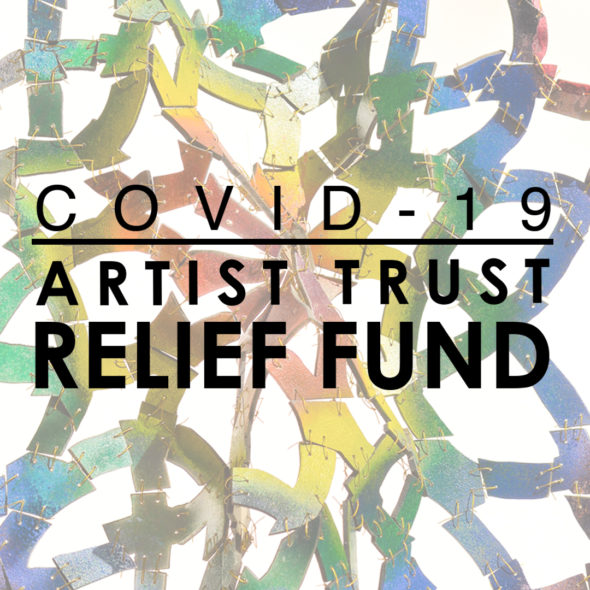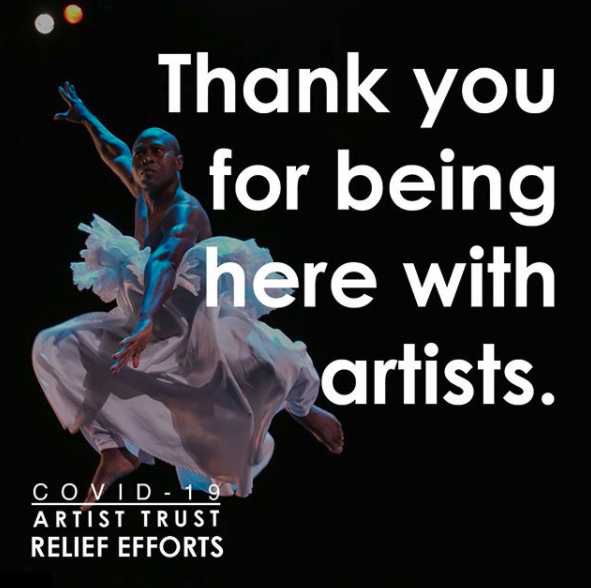Seattle is an incredible city for the arts. Unfortunately, when you combine a large and vibrant artistic community with the first reported domestic case of COVID-19 and quick shutdowns, the result is a massive population with immense need. Luckily, organizations like Artist Trust that serve Washington artists have moved quickly and efficiently to provide relief.

Artist Trust was founded by a group of artists and arts supporters in 1986, a time when funding for individual artists through the NEA and federal government was being challenged, and the organization awarded its first grant in 1987. On average, Artist Trust awards $350,000 annually to individual artists across disciplines in Washington state with a focus on enriching community life and improving racial equity. The organization also focuses on offering resources, opportunities, connection, and advocacy, and they’ve been using Submittable since 2016 for grants, awards, events, and art auctions.
What Artist Trust did
In light of the variety of immediate threats to the life and livelihood of its community (including performance and event cancellations, travel restrictions, health endangerment, layoffs, and closures), Artist Trust launched one of the first emergency grant funds for artists in the country on March 20.
Its COVID-19 Artist Trust Relief Fund is awarding between $500 and $5000 on a rolling basis to impacted Washington resident working artists in all disciplines. As of May 18, Artist Trust has distributed a total of $475K to 271 artists statewide through the relief fund.

According to Program Director Brian McGuigan, the need among artists was immediate and undeniable.
“We have a really, really big performance community,” he says. “Dance is huge in Seattle, with internationally known choreographers and performance spaces, and our music scene is really large. But if you don’t have a place to perform, you don’t really have a place to make money.”
“We also have a lot of folks,” he continues, “who rely on the gig economy to make do—we’re still in that place in Washington where folks can kind of string it together. But this also means that they don’t really have the safety net. Washington is a really great place to be a working artist and at the same time, when something like this happens, it shows you how little support there is for folks to be able to survive.”
How they did it
The team at Artist Trust mobilized to set up grants as quickly as possible. To enable a swift launch and streamlined process for all parties, McGuigan says it was important to simplify.
“Putting together a grant application for one of our normal programs takes a lot of time,” he says. “Submittable is super easy to use but the process still takes time. We had to do that process really, really fast—basically in two days. In terms of advice for others, I would say to limit what is required both for yourself as an organization running a relief fund and also for the applicants.
The Artist Trust relief fund grant application contains only five questions beyond contact details and demographics.
According to McGuigan, “We really wanted to keep it simple—basically, what support do you need and how will this relief help you? We’re not requiring work samples or anything like that. It’s important to limit the process both for yourself as the funder and for the applicant.”
Because of the speed with which Artist Trust pushed to open grant applications for their relief fund, the team anticipated that their ability to make adjustments would be important.
“After we first created the application,” McGuigan says, “we did go back and make a few changes to improve the system. Normally when you put an application together, you’re just kind of stuck with what you created.”
As he observes,
For this, we just really knew that we needed to be able to be flexible, both concerning the backend and then also with how we're running the process. We wanted to build it with the ability to be iterative as we went along.
In addition to identifying needed updates on their own, leadership at Artist Trust sought out community knowledge to ensure best practices.
As McGuigan shares, “I’ve learned so much from talking with other funders about how they’re running their programs—it’s helped me think about how we do ours, especially in terms of review. It was through these conversations that we realized, okay, we need to do a lottery instead of first come first serve because first come first serve serves the people closest to you. And that goes against all of our work around equity, especially racial equity.”
Artist Trust as an organization focuses on serving artists in a variety of ways—their support is financial but also personal and career-oriented.
“We provide professional development programming for artists,” McGuigan says, “that includes marketing, promotion, business skills, taxes, finance, legal issues, those sorts of things—things most folks don’t really learn about when they’re getting their degree or when they’re self-taught artists.”
This type of support is especially significant during COVID-19, as is the work of public advocacy.
“During the pandemic,” says McGuigan, “we’re finding that the advocacy work we do, providing business and career support, is really critical because so many artists don’t have a safety net— they don’t have the kind of support systems available that help with getting recognition and support from government agencies.”
According to McGuigan, “We’re rallying the troops around this idea that providing support for artists is as critical as providing support for airlines or the car industry because arts and culture is as important, just maybe not as recognized.”
Doing the relief work Artist Trust is dedicated to at this moment is not without obstacles.
“A major difficulty,” McGuigan says, “is the obvious fact that the need far outweighs the available funds right now. I think that is probably the biggest challenge and having to accept the reality that we’re not gonna be able to help everybody, even though so many people need help. We can only try to do the best we can.”
He also acknowledges the personal strain addressing such immense needs can have on funders.
“On a personal note,” says McGuigan, “I think that the biggest challenge for me is the shift required to be able to do this work. The applications that we’re getting and the personal emails and phone calls and texts and Facebook messages make it clear that folks are really scared and worried—they’re feeling anxious and alone. And I think that’s hard to figure out how to navigate on a personal level.”
Artist Trust is working to meet the most pressing needs of its community with an eye to the future.
“The short term goal of the relief fund,” McGuigan says, “is just helping these artists keep their homes and put food on the table. So many of the folks that are applying for support need immediate relief, they need to pay their rents.”
Over two months after opening the fund, it’s clear how significant the effects of COVID-19 have been for artists in Washington.
“We had received nearly 2,500 applications,” says McGuigan, “totalling over $5.3 million in requests for support. So that gives you a sense for the tremendous amount of need out there and in our state.”
For the long term, Artist Trust is trying to raise as much money as possible to serve their community.
“We are actively fundraising,” McGuigan says, “working with both individuals in the area and partnering with foundations and other agencies to provide the support for more ongoing work.”
As he shares,
We're hopeful that eventually we'll shift our relief efforts toward recovery, thinking about how we can work together with artists and with the community to rebuild the world and to bring people together again once we're able to come out of our homes.
What’s next
The team at Artist Trust is working nonstop to build up the fund.
“You can support us by donating to relief efforts,” says McGuigan, “and by sharing our information with your own networks. That’s really helpful.”
Wherever you are, McGuigan acknowledges that artists are going to need our support for some time.
 “Social distancing is going to be a thing for a while,” he says, “and it’s going to be hard for artists to make a living because they’re not able to come together with audiences to be able to do that.”
“Social distancing is going to be a thing for a while,” he says, “and it’s going to be hard for artists to make a living because they’re not able to come together with audiences to be able to do that.”
“The biggest way you can support artists,” he continues, “is to buy their work and share it to support building more audience and notoriety for artists right now.”
Still, it’s not always about money, or even amplifying an artist’s network. McGuigan wisely observes the value of thoughtful, direct communication.
**Cover image by Ellen Forney.
Learn about how Submittable can help your organization respond to COVID-19. For more on groups like Artist Trust giving back through emergency grants, check out recent COVID-19 Response profiles.
